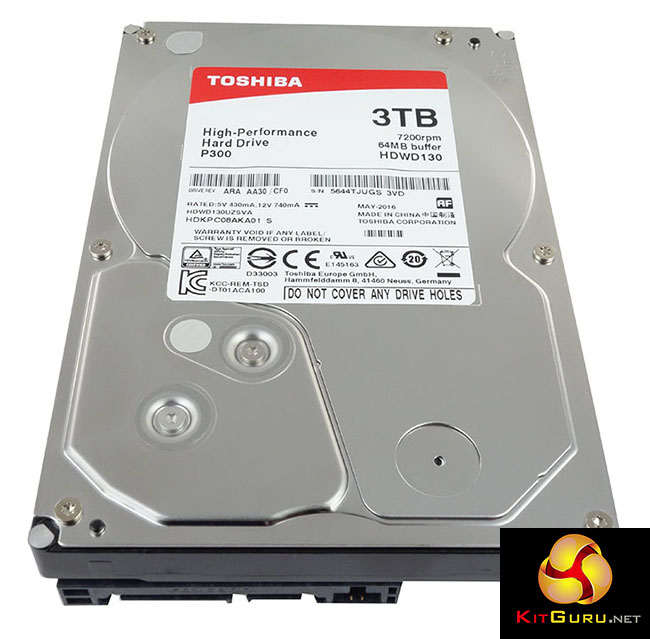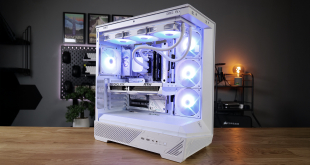Although we keep hearing the death knell for the mechanical hard drive particularly in the consumer market, they will still be around for some while yet. Sales figures for HDD's actually picked up in Q3 2016 (desktop drives were up 12.4%) although this must be seen against the steep drop in sales in Q1 and Q2. Even with the market in decline, the three HDD companies still sold over 113M drives between them in Q3 2016.
Toshiba's P300 drive ticks all the boxes for a modern hard drive; Perpendicular Magnetic Recording (PMR), Tunnel Magneto-Resistive recording technology (TMR), Halogen Free and Advanced Format technology. The range also adds another couple of data protection features to the list; an internal shock sensor and ramp loading technology.
The 3TB drive (and the 2TB one) also have a dual-stage actuator which helps overcome the difficulties of positioning the read/write heads accurately when dealing with today's high-density disks and it also helps prevent misalignments caused by any vibration effects on the drive. Although home users may not give hard drive problems caused by vibration a second or even a third thought when you start adding a few drives together in a large NAS type enclosure, vibration problems may start to become an issue.
The drive is very quiet in operation even when it was being pushed hard in some of the benchmarks. Quoted power consumption for the 3TB P300 is 6.4W for typical Read/Write operations and 5.2W in low power idle mode.
We found the 3TB P300 for £79.97 (inc VAT) at Ebuyer HERE
Pros
- Overall performance.
- Internal shock sensor
- Dual-stage actuator
Cons
- 2-year warranty is a bit mean
Kitguru says: Toshiba hard drives are often overlooked particularly the 3.5in ones, but the P300 3TB model is a very competitively priced mainstream drive with decent performance.
 KitGuru KitGuru.net – Tech News | Hardware News | Hardware Reviews | IOS | Mobile | Gaming | Graphics Cards
KitGuru KitGuru.net – Tech News | Hardware News | Hardware Reviews | IOS | Mobile | Gaming | Graphics Cards





Western Digital is the way to go.
But if you don’t want to pay a premium for a 7200 RPM drive… The WD blue series dropped 7200 RPM and are only 5400 RPM. You need a WD black for 7200 RPM.
Seagate has a bad reputation for reliability. However, the price/storage is the influence in this segment for purchases.
I’d still choose the X series Toshiba as it has 128 megs of cache for the 4 TB drive.
3 TB P series and 64 meg seems small (in comparison to others).
Not sure if its a huge difference in performance.
I have my eyes on the X400 seriers for some time now, my aging WD Blacks will need to be replaced soon (they are beasts however, 10 year now they run like champs).
I heard toshiba have good reliability now, maybe not as good as HGST but if they can match WD I’m sold.
(Seagate and reliability are not compatible, sorry and hello from the .11 fiasco 😀 )
Seagate having bad reliability is not entirely true . They did have some issues with their 1.5TB drives failing, but they are perfectly fine otherwise. People just assume they are bad because of Backblaze reports, which have vastly different sample sizes and also have consumer grade HDDs deployed in enterprise environment. But at the end of the day every mechanical drive dies at some point and I’d recommend upgrading HDDs at least once every 5 years.
Well personally when I say seagate is not reliable I don’t necessary speak for the drives alone. Reliability from a company can consist of many factors like if there is problem with a product, to inform consumers in time to save their data and change the drive.
Many people tend to forget or ignore the fact that the .11 series fiasco was more a fiasco because seagate failed to communicate the problem and recall the drives for almost a year!
Sure EVERY hdd maker out there can push in the market some bad drives because of manufacturing error, the problem is what they will do after the s**t hit the fan.
Seagate on their side just ignored the problem for the first 6 months saying there is not any problem with their drives at all, then they said that maybe (just maybe) there are some issues but you can fix it with that new firmware we released (wait, you said there is no problem, how did you made a firmware to fix a problem that doesn’t exist?) and after 6 more months that this firmware just bricked a lot of drives (from the ones who where still working) they decided to do a recall and say that yes, the drives from series .11 have a non fixable problem!
Now I could let something like this slip if it was for let’s say a gpu, it could be a headache but not a headache like the one you get if you lose valuable files!
So yes it is not like seagate just have unreliable drives, they are as a whole unreliable.
I was paid 104000 bucks past 12 months by doing an online work and I was able to do it by working in my own time for several hours on a regular basis. I used work opportunity I found out online and so I am thrilled that I was able to make such decent money. It is really newbie-friendly and I’m so blessed that I discovered out regarding it. Have a look at what I do… http://nubr.co/NJGhT1
Jure.. I am talking about the Blackblaze reports. I’ve had many Seagate drives more than 5. The only one that I’m afraid to use is the Hybrid Drive. It for some reason causes errors on every hard-drive in my system when I use it.
Anyhow, to say that Seagate is unreliable As Nikolas (below) says as a company. I’m not sure. Seagate and Western Digital are in the same bed. Western Digital is a subsidiary of Seagate now. I think that might be why Western Digital Blue dropped 7200 RPM as it was competing against Seagate line of 7200 RPM.